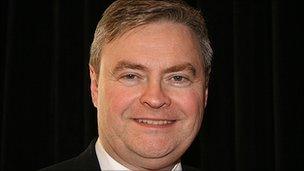UKIP MEP Campbell Bannerman defects to Conservatives
- Published

Mr Campbell Bannerman has rejoined the Conservatives after seven years in UKIP
One of the most senior figures in the UK Independence Party, David Campbell Bannerman, has defected to the Tories.
Mr Campbell Bannerman, one of UKIP's 12 MEPs in the European Parliament and deputy leader, lost out to Nigel Farage in a leadership contest in November.
He said he had been "impressed" by David Cameron's leadership while UKIP was beset by "internal fighting" and was not a "credible" political force.
UKIP said the MEP had "put career before principle" and should resign.
Mr Campbell Bannerman left the Conservatives for UKIP in 2004, accusing the party - at the time led by Michael Howard - of a "two-faced" policy on Europe and was elected an MEP in 2009.
The MEP's return to the Tories comes just weeks after one of its other MEPs, Marta Andreasen, called for Mr Farage to stand down after what she said were "dismal" results in English council elections.
'Recent failings'
UKIP failed to increase its number of councillors despite Mr Farage claiming it was on course for significant gains.
Explaining his decision to swap sides, Mr Campbell Bannerman - MEP for the East of England - said UKIP had become "obsessed with single issue politics, internal fighting and shouting from the sidelines".
"With the recent failings in domestic elections, the ditching of policies and the lack of any credible plan, UKIP has confirmed it is not a serious, credible, fully-fledged political party but merely a pressure group," he said.
The MEP said he still supported the UK leaving the EU - in direct conflict with official Conservative policy - but it was better for the UK to "fight its corner" to get as much out of the 27-member union as possible.
He added: "I have been pleased with the robust stance taken by David Cameron and Conservative MEPs over the EU Budget negotiations and I believe that it is Conservative MEPs who are working hard to defend Britain's interests."
Mr Campbell Bannerman will join the European Conservatives and Reformists Group within the European Parliament which the Conservatives controversially joined in 2009 after leaving the European People's Party.
Foreign Secretary William Hague said Mr Campbell Bannerman would make a "valuable" contribution to their work.
"The Conservative Party is bringing in people who want to work in the national interest to sort out Britain's problems," he said.
'Some nerve'
But UKIP said Mr Campbell Bannerman was "obviously disappointed" by his performance in last year's leadership election, in which he came a distant third to Mr Farage.
"It is clear that David Campbell Bannerman has decided to put career before principle," a party spokesman said.
"David has expressed his admiration for David Cameron, who has announced that he will not give the people of this country a referendum on Europe because he believes we should stay in. He has some nerve criticising UKIP's credibility."
The party said Mr Campbell Bannerman had agreed, when he was chosen as a candidate in 2008, to represent UKIP for the full five-year parliamentary term or stand down.
"We call on him to resign so that we can get a real Eurosceptic to take his place," the spokesman added.
As recently as last June, Mr Campbell Bannerman criticised Mr Cameron's record on Europe telling the Guardian newspaper that the "British people face higher prices all because this coalition has not got the stomach to either get our rebate back or suspend EU payments until it has its accounts signed off".
Before joining UKIP in 2004, Mr Campbell Bannerman was a Conservative activist and former special adviser to the Conservative Northern Ireland Secretary Sir Patrick Mayhew.
- Published10 May 2011
- Published21 April 2011
- Published5 November 2010